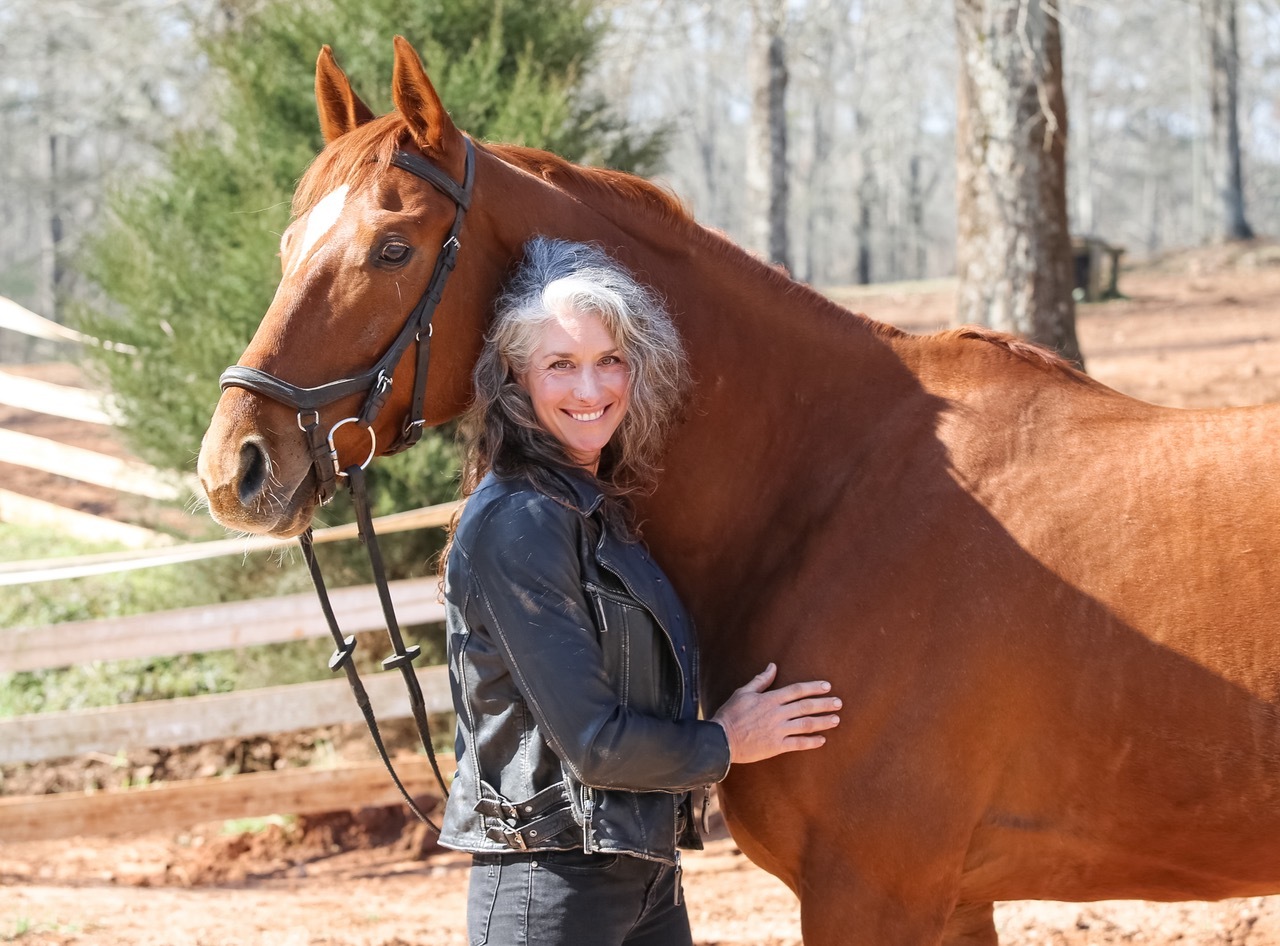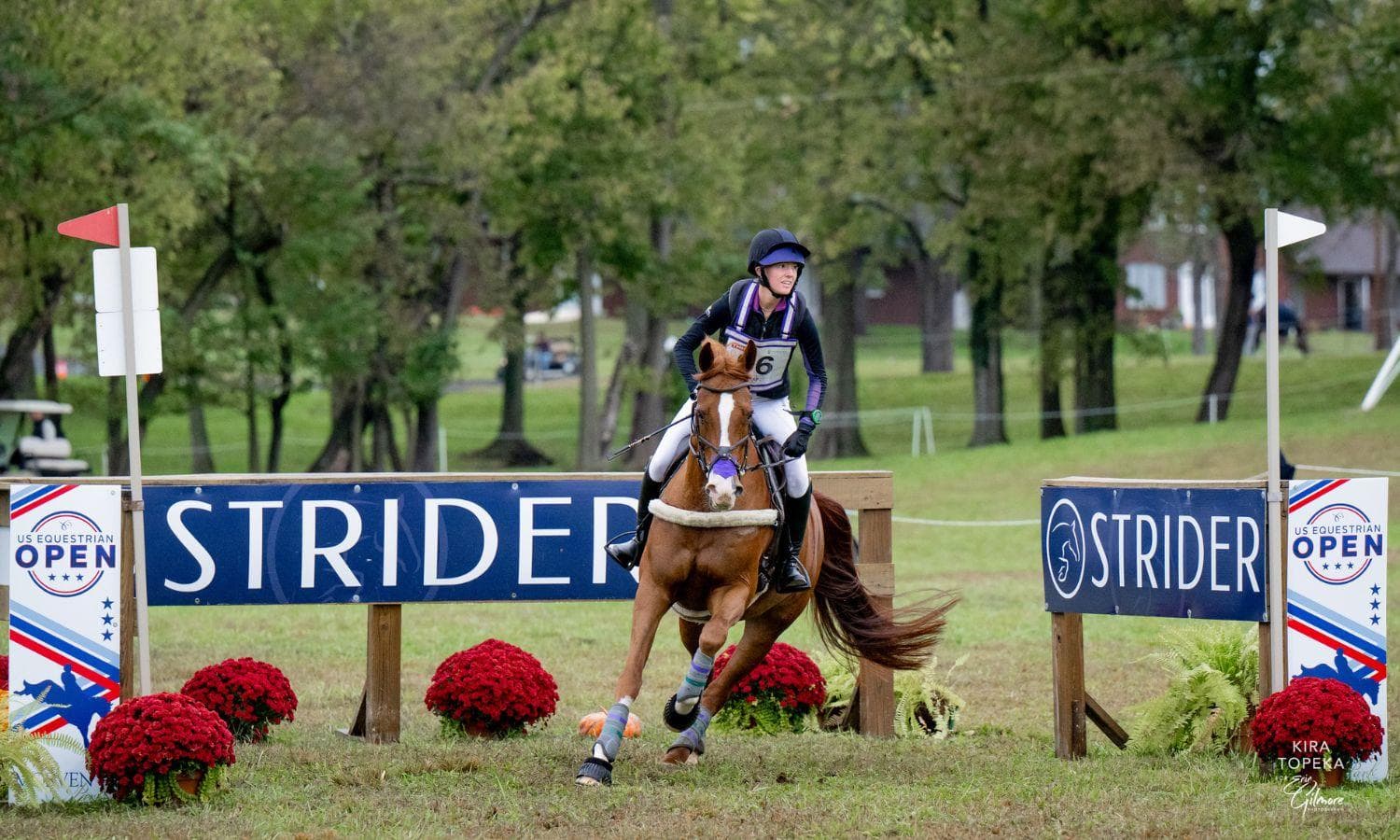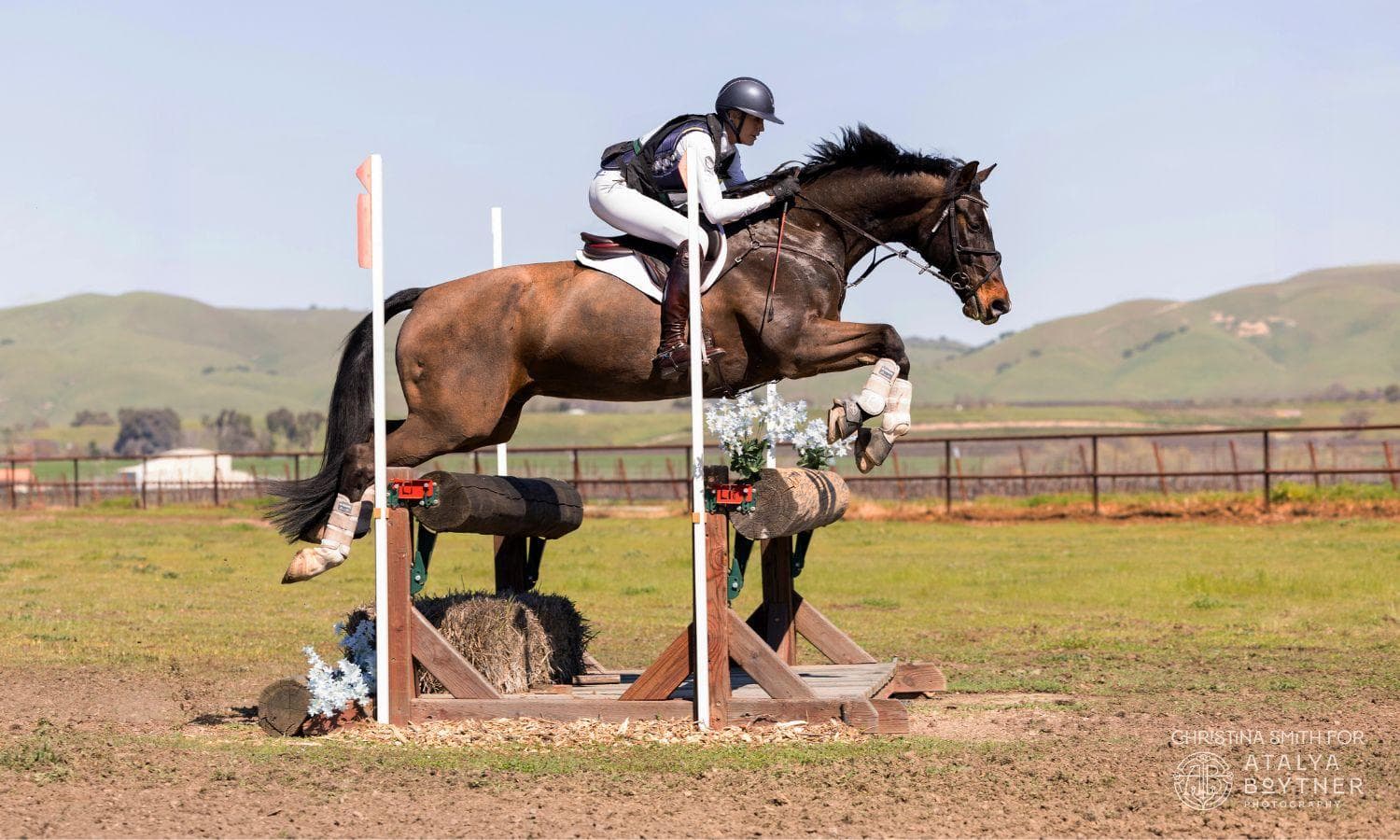Aubrey Graham: Finding Happiness in Thoroughbreds and Anthropology

This article originally appeared on sidelinesmagazine.com.
What do a cultural anthropologist and an equestrian have in common? One answer would be Dr. Aubrey Graham. Aubrey went from specializing in humanitarian aid in the Congo to mastering the art of re-training off-the-track Thoroughbreds (OTTBs) to be the best that they can be. “I used to conduct anthropological research in conflict zones as a way of looking for purpose. It might sound crazy, but finding ways to help and re-train Thoroughbreds—and the people around them—has fulfilled that pursuit and showed me what happiness can look like along the way,” Aubrey said.
Aubrey grew up in the small town of Chester, Connecticut. “I didn’t grow up in a horsey family, but I’m named after my great-grandfather who rode Tennessee Walkers,” Aubrey said. Despite not hailing from a family with an equestrian background, Aubrey’s early passion for horses became a defining aspect of her life. “My parents relented and got me lessons when I was 4 years old, and I probably have been on or around horses nearly every day since then—with a few breaks in-between to pursue my academic career.”
Aubrey’s true journey with horses started at the age of 8 when she got her first pony, Snowflake, with the support of her family. Snowflake played a crucial role in Aubrey’s development as a rider, teaching her valuable lessons about resilience and perseverance. “He taught me to ride a buck and how to stay on, even when the chips were down,” Aubrey said. Her step-up horse was a 16.2-hand Thoroughbred named Bold Sailor, and he was the beginning of her love and dedication to the breed.
Thriving on Challenging Horses
Aubrey began her horse career as a working student working for trainer Jenny Fischer of River View Farm in Montgomery, New York. “I learned to back 2-year-olds and sort out some bigger warmblood antics. Still, I gravitated to the Thoroughbreds,” Aubrey said. She had the opportunity to ride quite a few horses over the years at several barns. “I always rode the hard horses. ‘It bucks? Oh, cool. I’ll get on.’ ‘Won’t jump that fence? Can I try?’ ‘Too fast? Too spooky? Rears?’ I always got on.” Her willingness to work with difficult horses highlighted her fearlessness and determination, traits that would prove instrumental in her later endeavors as an equestrian.
After spending several years training in barns in New York and Connecticut, Aubrey made the move to Atlanta, Georgia, where she pursued her Ph.D. and began teaching at Emory College. It was during this time that she found her love for eventing. “I began eventing after riding the left-over cross-country fences from the 1996 Olympics at the Georgia International Horse Park, just down the road,” Aubrey said. Aubrey was given the opportunity to work with a 17.3-hand Appendix named CU Zip To Dixie, called Phoenix and owned by Sarah Edwards, not long after she moved to Atlanta. “Phoenix and I began eventing and moved up through Prelim,” Aubrey said. “He was the type of horse that gave it all on cross-country and didn’t ever think about stopping, regardless of the height of the fence or the difficulty of the question. Our dressage left a lot to be desired, but he lit the fire to go up the levels and I’m eternally grateful.”
Money was tight on her post-doctoral salary, but Aubrey was able to finally purchase her first Thoroughbred as an adult, Don’t Noc It, barn name Forrest. “Forrest laid the foundation for how much I love this breed and he gave me all the firsthand experience as to what they need to thrive—often by trial and error. I competed with him through Training Level, but neither his brain nor his body were well suited to go beyond that,” Aubrey said, adding that Forrest now has a more suitable job as a lesson school master for her students. “There have been a handful of other Thoroughbred loves and heartbreaks over the years, but I have come to truly enjoy the process of re-training Thoroughbreds.”

Horses Over Academics
Initially, Aubrey had envisioned an academic career path with training horses as a secondary job. However, her love for training horses eventually took precedence over her academic pursuits. “I committed to not going on the job market—a move often equivalent to academic suicide, and chose to pursue my second job full-time,” Aubrey said. She hasn’t looked back since, and has found a way to incorporate her formal education into her passion for horses.
Today you will find Aubrey at her farm, Kivu Sporthorses & Training, LLC, which she established in 2019 in McDonough, Georgia, just outside of Atlanta. The name of her farm holds a deep significance, serving as reminder of the province in which she did her fieldwork in the eastern Democratic Republic of the Congo. “I’ve been training semi-professionally since 2003, but this has been my first go at my own place,” Aubrey said. Since establishing her farm, the mission has transformed from basic training to a comprehensive training and sales program that is centered around the OTTB and specializes in working with horses that require additional confidence-building to reach their full potential.
Aubrey’s coach, Werner Geven, has been instrumental in her development as both a trainer and a rider. “His ability to push me and my horses and see through the ability to ‘do it’ to find the ‘how to do it better’ has been the roadmap that I use in my business,” Aubrey said. While Aubrey acknowledges the influence of others in her career, she holds a special admiration for her fellow re-homers and resellers of OTTBs. “Watching these folks make even the most complicated horses into stunning and ridable creatures is so extraordinarily impressive, it’s hard to find words.”
Aubrey has put her own upper-level riding aspirations on hold these past few years to help others to better understand the workings of the Thoroughbred mind. Her efforts not only benefit individual riders and horses but also contribute to the overall welfare and understanding of Thoroughbreds. “Watching people try my sale horses and sometimes struggle or listening to folks who brought their horses in for sale because they ‘just couldn’t ride them well’ inspired me to train not just the horses but the humans, too,” Aubrey said.

A Thoroughbred School
In 2021, Aubrey developed the Thoroughbred Logic platform, which included articles and in-house clinics. While these Thoroughbred-centered clinics continue at home and at farms around the East Coast, in 2023, Aubrey expanded the concept into a more in-depth platform of a Thoroughbred School. This expansion of the concept reflects her evolving vision and commitment to providing comprehensive education for both horse and rider. “I started with the clinics—pulling from my academic days of doing conferences—and found that I could entice people to stay all day, and engage with the horse and rider. By watching upwards of 10 Thoroughbreds go around, they would be able to also start seeing the similarities between the rides and gain a supportive community,” Aubrey said.
When you own horses, free time can sometimes be an anomaly. For Aubrey, free time includes writing a series of articles called “Thoroughbred Logic” for Horse Nation. “By honing in on the specifics of what I love, I’ve been able to gain a reputation that reaches beyond the Atlanta area, help people around the country and contribute to their horses’ success,” Aubrey said. Her interests in photography, hiking and wine reflect a diverse range of passions outside of the equestrian world. “When I lived in Cape Town, South Africa, in 2016 and 2017, I spent ample time visiting the region’s vineyards and the nerd in me loved sifting through all the data about the wine and its processes. I don’t get to do this as much here, but the passion remains.”
Aubrey runs a successful business of re-training Thoroughbreds to sell and hopes to one day be able to incorporate her business with a non-profit arm to help with rehabilitating and re-homing OTTBs. “I’m not trying to recreate any wheel, but to make another space to support these horses to have the best future possible, and eventually, I’d love to do it on my own farm,” Aubrey said. By extending her efforts to include a non-profit component, she would be ensuring that even more horses can benefit from her knowledge and compassion, ultimately leading to brighter futures for them all.
Aubrey's transition from being a cultural anthropologist specializing in humanitarian aid to becoming an equestrian focused on re-training Thoroughbreds may seem like a significant shift, but it's clear that her education and experiences have equipped her well for this current path. Aubrey has been able to build a community of horse owners who share her commitment to understanding and developing the breed to its fullest potential. “It’s a long road and I’m only at the beginning, but I’m beyond excited to see where this crazy journey takes me, my horses and the amazing community they’ve inspired,” she said.















